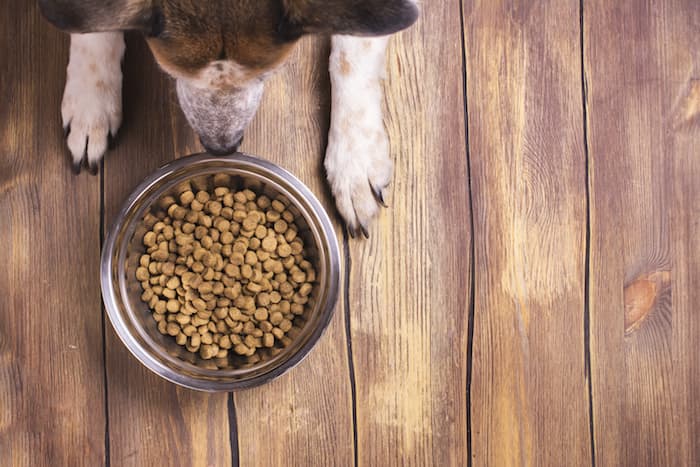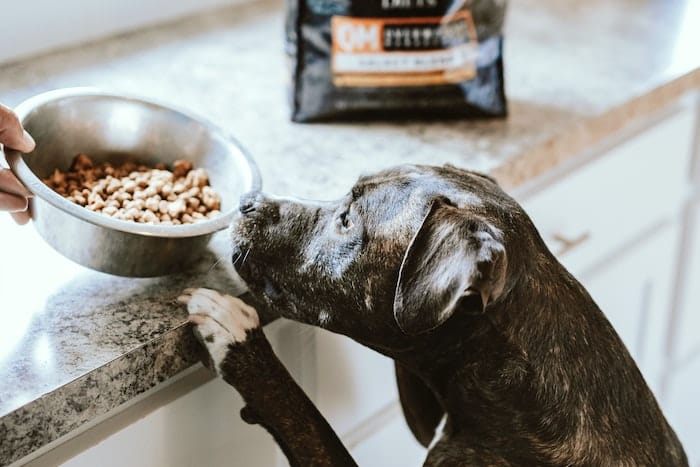Proper nutrient balance is vital when feeding your furry friend. Dogs need balanced nutrition containing proteins, fats, carbohydrates, minerals, vitamins, and water to repair and build muscles, bones, and teeth. It’s also crucial to maintaining muscle tone, helping them do their daily activities easily, and fighting off infection.
Nevertheless, dog food errors can compromise your pet’s health and life. Understanding these errors can help you avoid them by ensuring you’re making the right dog food choices. Here are seven common food mistakes dog owners make.

1. Feeding them any human food
Healthy human food is very nutritious and has many benefits for humans, but what about our furry friends? Not every human food is safe for your dog. For instance, foods containing raisins, chocolate, cinnamon, macadamia nuts, grapes, onions, garlic, and almonds are unsafe for dogs. Giving your dog table food regularly may encourage begging behavior, or cause them to refuse to eat their food. Other foods may even result in canine obesity.
Before feeding your dog any human food, find out what’s safe and what’s not to avoid compromising your pet’s life. Milk, bread, cheese, cashews, corn, coconut, eggs, fish, honey, and ham are dog-safe. Your furry friend can also eat peanut butter, pork, quinoa, shrimp, salmon, tuna, wheat or grains, turkey, and plain yogurt. If you’re yet to introduce human food to your dog, start slowly and ensure whatever you’re feeding them is healthy.
2. Poor diet
Feeding your pup high-quality food doesn’t guarantee proper nutrition. Health concerns arise if their meals aren’t balanced enough to meet their needs. A poor diet in dogs may result in allergies, nutritional imbalances, diabetes mellitus, pancreatitis and obesity, gastroenteritis, and metabolic diseases. It may also lead to urinary stones or crystals and excess vitamin D and calcium.
A complete and nutritious dog diet should have protein, carbohydrates, fats, minerals, vitamins, and water. Know how much of every nutrient is required for a healthy furry friend at each life stage. A qualified and skilled canine nutritionist can help you with your dog’s diet based on its health requirements and other needs.
3. Giving your dog too much or too little food
It is vital to feed your pup the right amount suitable for them. It enables them to stay healthy while preventing various health issues. Overfeeding your dog food and treats causes obesity after a constant mismatch between their energy requirements and energy intake.
Dog obesity is characterized by fat accumulation, high energy retention, and variable weight gain degrees (moderate to excess). When your dog becomes overweight, the risk of arthritis, diabetes, and other inflammatory diseases rises. Additionally, excess weight may also make it hard for your canine friend to move around easily, meaning less exercise and increased susceptibility to injuries whenever they try moving.
Overfeeding your dog may also cause skin problems, bowel issues, tiredness and lethargy, and joint problems. Underfeeding your dog may result in malnutrition. While weight loss is the common underfeeding symptom, your pet may also show other malnutrition signs, including a weak immune system, lack of energy, tummy problems, and skin and coat issues. The right amount of food for your furry friend should depend on the food type, body weight, number of daily meals, metabolic rate, and activity level.

4. Not reading dog food labels
There are different dog food varieties, including dry, raw, wet, age-specific, and restricted diets. Not reading labels when buying dog food is a common mistake most pet owners make. This means they won’t know the ingredients in the food and their effect on their pet’s health. Others might have controversial ingredients you, the pet owner, might want to avoid, even though they’re considered safe. Failure to read the label may lead to feeding your dog the wrong way.
Checking the labels when selecting dog food helps you determine if what you’re feeding your dog suits them. When reading the label, check the quantity, ingredients, guarantee analysis, nutritional adequacy statement, expiration date, and feeding instructions.
5. Buying age-inappropriate food
Dogs should be fed according to their ages because each life stage has unique nutritional requirements. Choosing age-inappropriate foods means your canine friend won’t get the nutritional value they need to stay healthy. If you have a puppy, their food should suit their growth and development. What you feed them is crucial in how they transition to adulthood. To ensure their best health, adult dogs’ diet should contain specific minerals, vitamins, and nutrients in a balance suitable for their activity levels and breed size.
Senior dogs also have their own nutritional requirements that you should adhere to. Health issues like kidney failure, liver disease, and diabetes may affect an old dog’s diet. In such cases, they may need special veterinary foods to help treat their condition. If you’re unsure what to feed your dog, your vet can advise you depending on their age and size.

6. Improper food storage
Poor food storage practices may result in contamination, infestation, and bacterial infection. Some of the food storage mistakes pet owners make include:
- Keeping dry food in a container: Avoid pouring kibble directly into a container and instead place the bag in a storage container. Keeping the food in its original package ensures it retains its flavor
- Leaving the food unsealed: Exposing the food to air may cause it to go bad quickly while increasing the contamination risk by dangerous bacteria. Keep the food tightly sealed after every feeding
- Letting food sit out for too long: Once you open canned dog food, don’t leave it unrefrigerated for too long. Read the food label for more details
- Keeping food at high humidity or temperature: Storing pet food in humid areas may impact its safety and freshness. As such, keeping canned food(unopened) and dry food in cool, dry environments can help prevent rancidity and loss of vitamins
7. Ignoring your canine’s health condition
Ignoring your dog’s medical history is a food-buying mistake that can aggravate their condition. If your furry friend has any health issues, consulting your vet can help get a prescription diet that can help attain their nutritional requirements. This can also help with the treatment of their ailments.
Endnote
A proper diet is essential for your dog’s overall health and happiness. Avoiding these dog food mistakes can help ensure you’re feeding your canine friend correctly.
